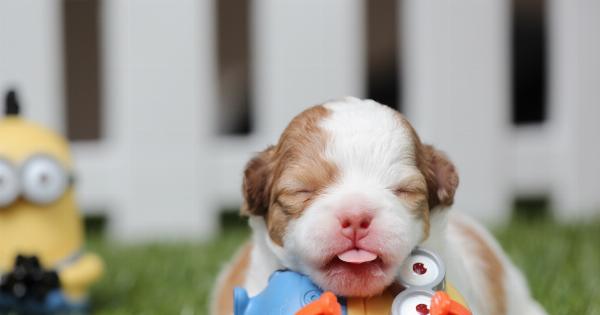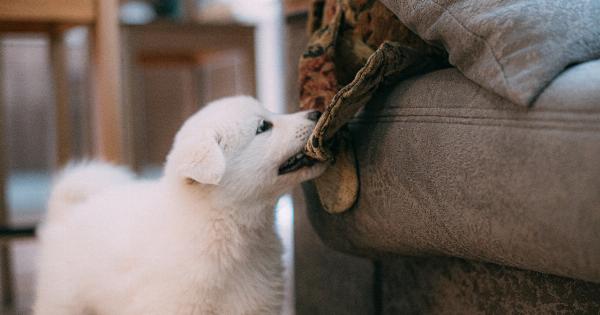Having a teething puppy can be both adorable and challenging. While it’s heartwarming to watch your furry companion grow and develop, their sharp baby teeth can cause a considerable amount of discomfort during their teething phase.
As a responsible pet owner, it’s essential to take measures to protect yourself from accidental nips and bites while still ensuring your puppy’s needs and well-being are met. In this article, we will explore various techniques and strategies to keep your hands safe from your teething puppy.
Understanding the Teething Process
Teething is a natural stage in a puppy’s life when their baby teeth, also known as deciduous teeth, start to fall out, making room for their permanent teeth to grow.
This period typically begins around 3 to 4 months of age and lasts until they are about 6 months or older. The discomfort and itching caused by teething can lead to increased chewing and biting behaviors as puppies seek relief.
Provide Appropriate Chew Toys
One of the most effective ways to keep your hands safe from your teething puppy is to provide them with appropriate chew toys. These toys not only serve as a healthy outlet for their chewing needs but also help soothe their sore gums.
Look for toys specifically designed for teething puppies, which are made from durable materials such as rubber or nylon.
Rotate and Freeze Chew Toys
Variety is key when it comes to your puppy’s chew toys. Rotate between different toys to keep their interest level high and to prevent them from getting bored.
Additionally, freezing some of their toys can provide additional relief for their teething pains. Cold chew toys numb their gums and reduce inflammation, making the teething process more manageable for both you and your puppy.
Use Bitter Apple Spray
If your puppy has a tendency to nip or bite your hands, using a bitter apple spray can be helpful. Bitter apple sprays are non-toxic and safe to use on your furry friend.
The bitter taste deters puppies from mouthing or chewing your hands, redirecting their attention to appropriate chew toys instead. Remember to follow the instructions on the spray bottle and apply it to your hands before interacting with your puppy.
Maintain a Consistent Schedule of Exercise and Playtime
Puppies often resort to chewing and biting behaviors when they are bored or full of pent-up energy. To prevent your hands from becoming their outlet, ensure your puppy gets enough exercise and playtime throughout the day.
Engage in mentally stimulating activities like puzzle toys or obedience training sessions to redirect their focus and tire them out. A tired puppy is less likely to engage in destructive chewing.
Provide Positive Reinforcement Training
Teaching your puppy appropriate behavior using positive reinforcement techniques is crucial for their overall development. Whenever your puppy plays gently without biting or nipping your hands, reward them with praise, treats, or their favorite toy.
Positive reinforcement helps build a strong bond between you and your puppy while reinforcing behaviors that you want them to exhibit. Consistency is key, so be patient and persistent with your training efforts.
Redirect with Distraction
If your puppy starts nipping or biting your hands, avoid yelling or punishing them. This only creates fear and confusion in your furry friend. Instead, redirect their attention by offering an appropriate chew toy or a treat.
Create a positive association between their biting instincts and the desired items, reinforcing the idea that chewing on toys is acceptable, while your hands are off-limits.
Use Baby Gates or Playpens
To prevent your puppy from having access to areas where biting and chewing can occur, such as your kitchen or living room, consider using baby gates or playpens.
These barriers allow you to create designated puppy-safe spaces within your home, where your teething companion can freely roam without the risk of damaging your belongings or biting your hands.
Teach Bite Inhibition
Teaching bite inhibition is an essential part of your puppy’s training. Bite inhibition refers to a puppy’s ability to control the force of their bites.
Encourage gentle and softer mouthing during playtime, and if your puppy bites too hard, let out a high-pitched yelp to startle them. This mimics how their littermates would react and helps them learn that rough play leads to an end of the fun. By teaching bite inhibition, you are helping your puppy develop self-control, which reduces the risk of accidental injuries.
Provide Healthy Diet and Appropriate Chewing Options
A balanced and nutritious diet plays a vital role in a puppy’s overall health, including their dental well-being.
Ensure your puppy is receiving a diet recommended by their veterinarian, consisting of high-quality food that meets their specific nutritional requirements. Additionally, some chew toys are designed to promote dental health by cleaning their teeth and massaging their gums. Consider incorporating these toys to maximize the benefits.
Seek Professional Help if Needed
If despite your best efforts, your teething puppy continues to display excessive biting behaviors or aggression, it’s essential to seek professional help from a certified dog trainer or an animal behaviorist.
They can assess the situation and provide personalized guidance, helping you address any underlying issues contributing to your puppy’s biting tendencies.
Conclusion
As a pet owner, it’s crucial to keep your hands safe from your teething puppy while still fostering a strong bond and ensuring their well-being.
By providing appropriate chew toys, maintaining a consistent schedule of exercise and playtime, using redirection techniques, and teaching bite inhibition, you can navigate through the teething phase with minimal discomfort and maximize the joy of watching your puppy grow into a well-behaved adult dog. Remember, patience, consistency, and positive reinforcement are key to helping your teething companion develop appropriate chewing habits.





























